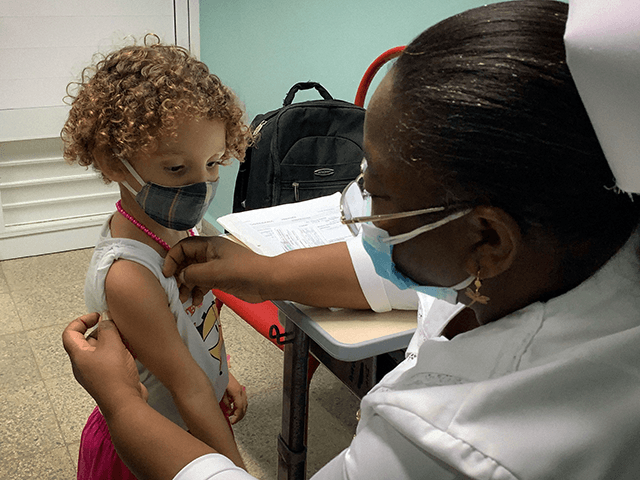Cuba began inoculating children as young as two years old against the Chinese coronavirus on Monday with domestically produced vaccine candidates that have not received approval from the World Health Organization (W.H.O.), Agence France-Presse (AFP) reported.
Cuban health officials on September 6 “started distributing jabs in the 2-11 age group in the central province of Cienfuegos,” according to AFP. The island began administering Chinese coronavirus candidates to children aged 2-18 years old on September 3, according to the German broadcaster Deutsche Welle.
The vaccine candidates administered to Cuban children on Monday were among two inoculations against the Chinese coronavirus “first developed in Latin America.” Known as “Soberana-2” and “Abdala,” the vaccine candidates have yet to undergo international, scientific peer reviews.
“Children ages 2-18 will receive Soberana-2; adults receive Abdala. Both have been approved by local [Cuban] regulators but have not undergone international peer review,” Voice of America (VOA) reported Monday.
Cuba is the first country in the world to administer Chinese coronavirus vaccine candidates to toddlers, though other nations including Venezuela, China, and the United Arab Emirates (U.A.E.) have said they plan to do so.
Cuba’s Chinese coronavirus inoculations “are based on recombinant protein technology — the same used by the United States’ Novavax and France’s Sanofi jabs also awaiting W.H.O. approval,” according to AFP. Vaccines based on recombinant protein technology do not require extreme levels of refrigeration. This makes them more viable on the Caribbean island of Cuba, where temperatures are milder and access to electricity for refrigeration may be limited.
“While other [Chinese coronavirus] vaccines trick the body’s cells into creating parts of the virus that can trigger the immune system, the Novavax vaccine takes a different approach,” Yale Medicine explained in an article published August 26 detailing how recombinant protein technology works.
“It contains the spike protein of the coronavirus itself, but formulated as a nanoparticle, which cannot cause disease. When the vaccine is injected, this stimulates the immune system to produce antibodies and T-cell immune responses,” according to the article.
“The protein-subunit approach used by Novavax was first implemented for the hepatitis B vaccine, which has been used in the U.S. since 1986,” the Atlantic reported on June 24. “The pertussis vaccine, which is required for almost all children in U.S. public schools, is also made this way.”
Cuban state media said this week it began inoculating children aged 2-11 against the Chinese coronavirus in an effort to get students back to in-person learning. The communist island started its new school year on September 6 but most students remained at home, watching lessons broadcast via state television, due to the ongoing coronavirus pandemic.
“Most Cuban homes do not have internet access, and with its schools closed since March 2020, most children learn by watching television programs,” VOA noted on Monday.
Cuba’s pediatric vaccination campaign “should end on November 15,” Ilena Morales, the director of Science and Innovation from Cuba’s Ministry of Public Health (Minsap), told DW on September 3. She added that the inoculation drive will be “gradual” and “intensive.” The effort to immunize children against the Chinese coronavirus is part of the Cuban government’s “strategy that sets the goal of reaching November with 92.6 percent of the population immunized,” DW noted last Friday, citing an official “note from the [Cuban] Presidency.” Cuba has a population of 11.2 million people.

COMMENTS
Please let us know if you're having issues with commenting.